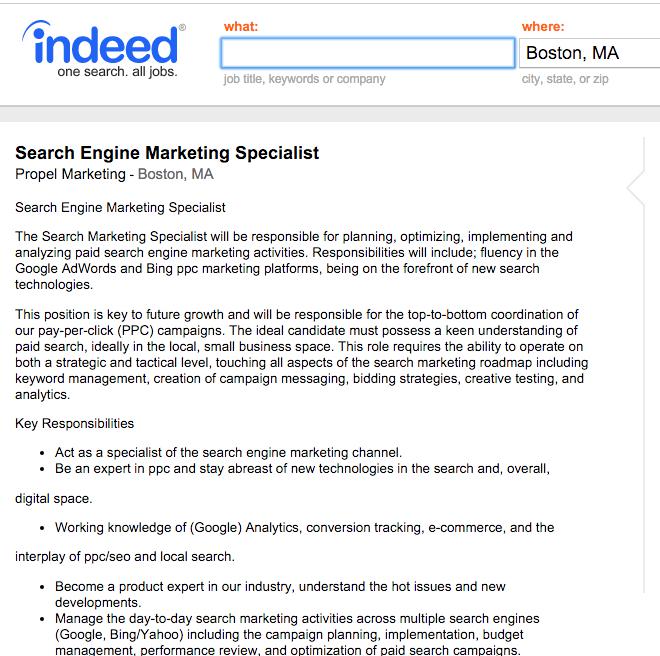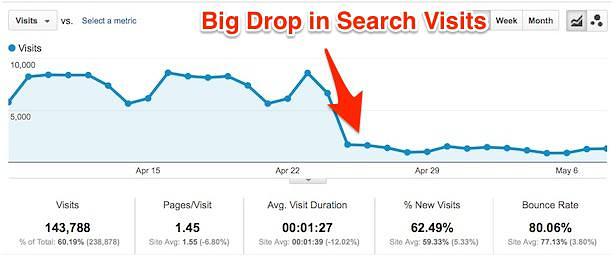

What are Soft Skills?
First, let me define soft skills.
The simple definition is this: “Personal attributes that enable someone to interact effectively and harmoniously with other people.”
Soft skills are the personal qualities of the SEO, and they translate into how effective or ineffective the SEO is at managing and interacting in a professional environment.
Hard skills, on the other hand, have to do with SEO’s specific training, experience, and technical acumen. They may include things like creating meta-tags, mapping URLs, developing a content calendar, or improving site speed.
Soft skills are completely removed from the analytical data-driven repertoire of the SEO’s technical capabilities. Soft skills are focused on people, behavior, and interpersonal situations.
Soft skills are so much a part of a job that some employers view them as the yang to the hard skills’ yin.
From a neuroscientific standpoint, this very well may be true. The conventional bifurcation of right brain/left brain thinking does an adequate job of differentiating soft skills from hard skills.
Left brain thinking involves logic, analysis, facts—the SEO’s ability to parse data, configure robots.txt, and analyze ranking factors. Right brain thinking involves persuading the content team to implement longtail keywords, and explaining to the development team the importance of minifying CSS to improve site speed.
Most employers look for soft skills, whether they are explicit about it or not. As an example of this, I searched “SEO jobs,” and clicked on the first result that came up from Indeed.com.
The application is standard and straightforward. The agency needs an individual who is adept at paid search technology and strategy.
However, the job posting is replete with understated references to soft skills. I skimmed through the bullet points and identified the need for a candidate who is driven, strategic, a leader, a communicator, curious, a learner, and an educator.
A Federal Employment agency study of job openings in the IT industry found that job postings were filled with soft skills.
Obviously, soft skills are critical. But why?
More specifically, why are soft skills important for SEOs?
Why Are Soft Skills Important for SEOs?
Hard skills are the skills and abilities that enable the SEO to do the job, but soft skills enable them to get the job done. In other words, the SEO can’t effectively do their job unless they possess the right soft skills.
You’ve probably heard of the concept of the T-shaped marketer. The idea is that every successful marketer should possess a broad array of skills, but go deep in a particular area.
In any given SEO agency, you may find an individual who is really good at technical SEO. Perhaps this person also dabbles in social media marketing, video, blogging, and email marketing. Nevertheless, her primary skill is technical SEO and its attendant tasks, but she has an awareness of the other essential areas of marketing.
The T-shaped concept is really helpful, but it only focuses on technical skills. Behind this T-shaped marketer is an entire halo of important skills. They are less objective, more intuitive, and no less important.
These are the soft skills of the SEO. Although we can and should identify our T, and the T of those we hire, it’s also important to be aware of all the soft skills that go into allowing the person to thrive.
Here are some of the concrete reasons why SEOs should possess soft skills:
- To coordinate: Many agency SEOs have the important task of getting various departments to work together. Unless you get your dev team talking to your creative team talking to your design team, while all talking to you, you’ll get nowhere fast.
- To learn: This article opened up with the statement that SEO is constantly changing. The field, by its nature, demands SEOs keep pace with the change, and continually upgrade our knowledge and skills. We can’t rely on last year’s strategy to make an impact this year.
- To adapt: Adaptability is key. Pivoting from a defunct strategy to an innovative new channel is part of the fun and confusion of being an SEO.
- To educate: A lot of people still don’t “get” SEO. The SEO’s job is more than doing. It’s also explaining. Whether you need to explain responsive design to the CEO or the importance of site speed to the designer, you’ll constantly be in teaching mode.
- To persuade clients to act: As Grant Cardone wrote, “We’re all selling, all the time, whether we know it or not.” Selling requires persuasion. Perhaps you need to persuade the client to purchase your services. Perhaps you need to persuade the client to implement your advice. Perhaps you just need to persuade your boss that content marketing is indeed important. Whatever the case, persuasion — a soft skill — is required to make SEO work.
In a nutshell, the SEO needs soft skills in order to succeed. It’s just that simple.
In one study by Right Management, nearly 1,000 professionals were asked about the factors that lead to “accelerated performance.”
You would think they would pick things like “experience,” “knowledge,” and “skills.” Those were indeed part of the overall picture of success, but not the predominant parts.
The biggest components of success — 78% — had to do with soft skills.
Even If you possess the world’s deepest and most advanced SEO knowledge, you’ll be ineffective in an agency or business if you don’t have honed soft skills.
So, let’s talk about those soft skills.
What Soft Skills Should an SEO Have?
1. Persuasiveness
An SEO who is a skilled persuader will be a powerful force in any organization.
SEO requires persuasion on many levels. You may need to persuade skeptical customers to purchase your services, or skeptical executives to implement your strategy.
2. Adaptability/Flexibility
I can’t emphasize this point enough. Adaptation to industry changes and flexibility to bend marketing strategies are a regular part of the SEO’s job.
Take a look at what SEO used to be versus what it is now.
How much time has passed since the “old SEO?” Just a few years. How much adaptability have SEOs had to embrace the mean time? A whole lot!
A 2014 survey of marketing soft skills identified “the ability to embrace change” and “adapt strategies quickly” as the top two skills.
The field of marketing is always changing. But the field of SEO is particularly affected by this constant change. SEOs, as players in the most change-vexed field of marketing, must be highly flexible.
3. Patience
SEO doesn’t produce instant change.
Sure, there may be some rapidly indexed pieces of content, and some quick wins due to some optimization, but overall, SEO demands a slow-and-steady-wins-the-race approach.
While it is true that SEO rapidly evolves, it is also true that consistent gains require a substantial amount of time.
Google’s algorithm has shown us that it is quick to punish sites (you could drop out of the ranks overnight), but slow to reward sites (gaining a few positions in the search results takes months).
What this means is that SEOs should possess the soft skill of patience.
4. Strategy
SEOs should learn to embrace all of marketing, not just their own niche of SEO.
SEO is a very narrow slice of the great big marketing world. SEOs need to integrate disparate strategies, approaches, and methods in order to make a meaningful impact.
UpCity’s Guide to Hiring a Professional SEO paints a picture of the SEO as someone who can integrate different types of marketing into a strategic whole.
How can we define an integrated approach? An integrated approach views SEO as part of the digital marketing milieu. SEO is a marketing methodology, and it must interact with other methods such as paid search, content marketing, branding, PR, and social media. ‘Strategy’ runs the risk of being a buzzword. Nonetheless, an overall strategic vision is critical. SEOs with a strategic mindset can better adapt to the integrated approach discussed above.
The greater amount of strategy the SEO possesses, the more successful they will be.
5. Curiosity
SEOs should be curious.
Why? Because there are constantly new strategies to learn, new techniques to investigate, and new data to learn from. A high degree of curiosity will enable the SEO to successfully understand more about their job and how to improve.
6. Team Player
Even though “team player” is last on my list, it’s one of the first soft skills that an SEO should possess.
What do I mean by “team player?” A team player is someone who can easily interact with, enjoy, and provide value to his or her team members.
Why is this so crucial in SEO?
Here’s why: SEO is no longer the realm and responsibility of one person in an organization (an in-house organization); nor is SEO a single department in a marketing agency.
SEO is everywhere. SEO has wormed its way into everything tech and marketing — mobile, content, paid search, UX, design, personalization, customer personas, conversion rate optimization, split testing, user testing, coding, everything.
SEO is also an imperative for any type of business — local, global, or anything in between. From legal agencies to manufacturing behemoths, SEO plays a role in the business’s success and survival.
Keith Goode, the Chief SEO Evangelist at seoClarity, calls this the “democratization of SEO.” As he explains, “SEO [is] embedded into the fabric of your organization.”
The SEO’s role becomes intensively team-focused, since the SEO must both train people, and then have those individuals champion the cause of SEO.
SEO needs to be backed by an alliance of knowledgeable individuals within the organization who understand SEO’s principles, and realize SEO’s value in the overall success of the company.
What does this require? It requires the SEO be a team player.
Conclusion
Each SEO has a unique blend of technical skills. In the same way, each SEO has a unique blend of soft skills.
If every SEO had the same soft skills to the same degree, the world of marketing would be boring and predictable.
As you assess your own soft skills and those of the SEOs around you, you’ll see a huge variety. Whatever kinds of unique approaches, abilities, and idiosyncrasies you identify, you’ll no doubt see the importance of soft skills.
[“source-searchenginejournal”]




